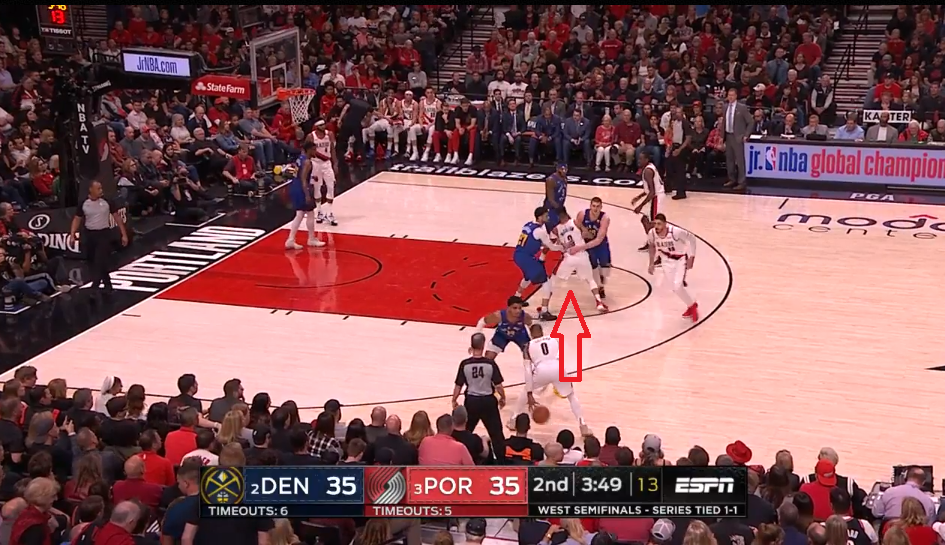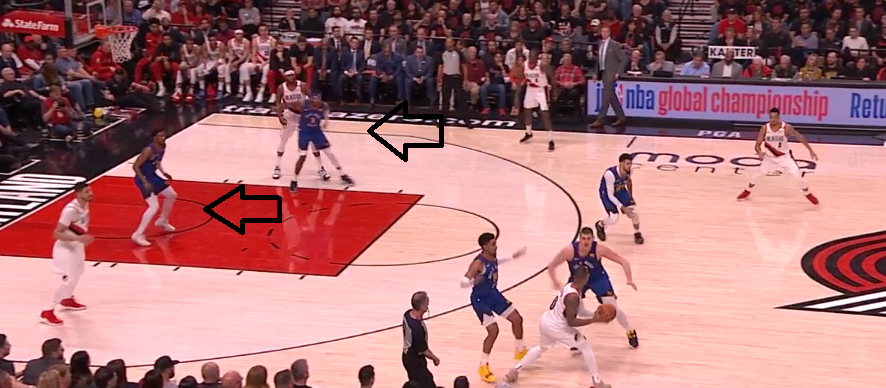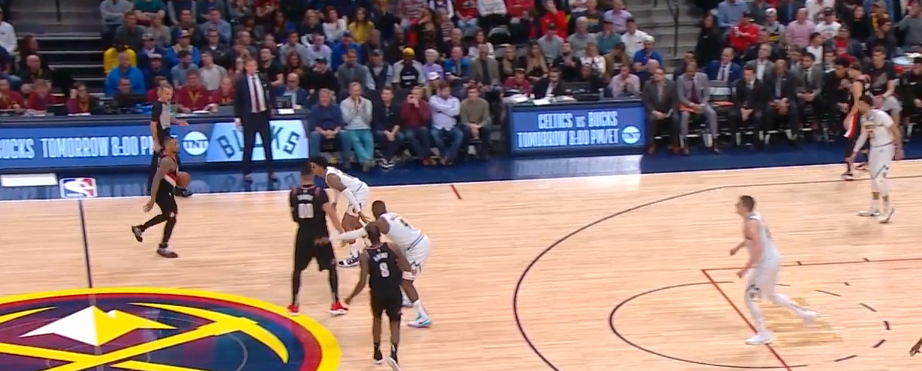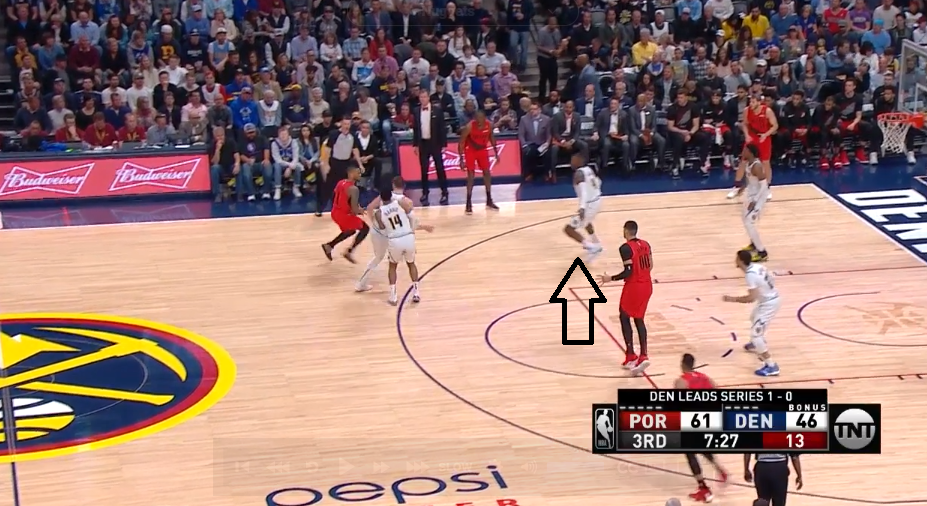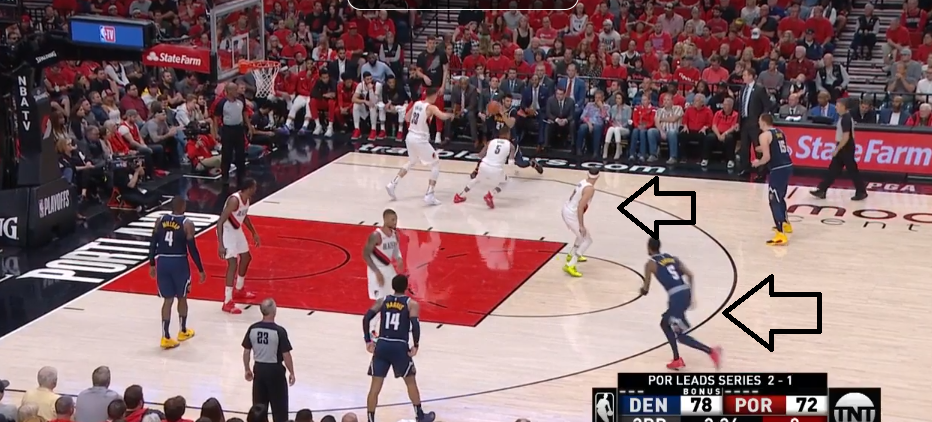Twenty-three thoughts on the wildest series of a wild second round:
It is easy to dismiss this as the consolation series: Win, and Golden State or Houston tramples you. Yeah, the winner here will be a huge underdog in the Western Conference finals. The Portland Trail Blazers and Denver Nuggets have to be exhausted. Damian Lillard has looked fried for portions of this series, including for the last hour or so (!) of the epic four-overtime Game 3 of this conference semifinal. He spent extended stretches acting as decoy, loitering on the wing as CJ McCollum ran the show.
A willingness to share the stage is part of what makes Lillard a beloved, galvanizing leader. But this looked different. Lillard was passive — standing instead of cutting or screening. Decoy mode lasted longer than it should have.
The Nuggets are also making Lillard work on defense, often trying to get him switched onto Jamal Murray.
• Denver’s resiliency is remarkable. Snagging two borderline must-win Game 4s on the road requires guts and confidence you don’t typically find in teams this green. Portland and San Antonio both went 32-9 at home, tied for the league’s third-best mark, behind only Milwaukee and the Nuggets themselves. Beating both on the road, down 2-1, is a major accomplishment.
From the last week of March to Sunday, the Nuggets played 20 games in 39 days. Denver is tough.
• On the opposite side of the bracket, Kevin Durant is carrying a Golden State Warriors team that suddenly looks thin and a little wobbly. Durant might not be on that team next season. They have no cap space to replace him and almost no bench. Draymond Green is 29 and had to go on a quick-fix diet — planned, but still — to get in playoff shape. Stephen Curry is 31 and dealing with injuries and foul trouble. Those are annual postseason occurrences now.
Curry has another gear in reserve if Durant leaves. Golden State won a championship and then 73 games that way. Curry’s alleged postseason struggles are a little overblown. His numbers are very good, and his impact on Golden State’s offense always extends beyond those numbers.
But it’s hard to watch these Warriors and conclude that the theoretical post-Durant version would be anything like a lock to enter next season as favorites in the West. That is the real backdrop to this Denver-Portland war of attrition, even if it doesn’t seem that way.
• The Blazers and Nuggets are almost mirror images of each other. They lean slightly offense-first, and the series has leaned that way too. The combined score after four games is Denver by two. They tied for the league lead in offensive rebounding rate, and they rank first and second in this round. They both take care of the ball and force few turnovers, and this series has been predictably clean. They prefer a slow pace.
They build their offenses around deadly two-man games and run lots of the same actions. The series can feel like an endless series of pick-and-rolls and handoffs on one side of the floor — with no other players on that same side.
For Portland, the danger is in its guards jacking open 3-pointers behind those picks. For Denver, it is Nikola Jokic — perhaps the most unpredictable and broadly skilled screen-setter in the league — taking whatever the defense gives him, and even some things it doesn’t realize it is giving.
Both defenses are attacking those pick-and-rolls aggressively, though Denver has its big men — mostly Jokic — scampering further to swarm Lillard and McCollum above the 3-point arc:
That starts with McCollum jamming Jokic — a pet Portland “screen-the-screener” action designed to shove Jokic behind the play:
The Blazers have cleared Lillard’s side so that he has an easy passing lane to Kanter, and Kanter a clear view of the floor on the catch. Denver has seen this a million times and knows what to do:
Malik Beasley, a stalwart in these playoffs, slides away from Maurice Harkless under the rim to account for Kanter. Torrey Craig shifts down from Al-Farouq Aminu to block any pass to Harkless but remains in position to dart back to Aminu. This is the past four seasons of Portland basketball: Teams leave Harkless and Aminu open, and the Blazers often win or lose based on how many 3s they hit. They are 4-of-22 against Denver.
• Aminu’s flash to the foul line is a smart counter. He can’t just chill in the corner. Standing there puts him parallel to Harkless. That is a tricky skip pass for Lillard and McCollum; it’s hard to see, and they have to throw it over multiple defenders.
• Jokic has been solid moving his feet, getting the ball out of Lillard’s hands and shuffling back into the paint. But there have been a decent number of instances in which he hasn’t come out far enough, and Lillard has had space to launch. Lillard has not been able to exploit those openings often enough. He has passed up some 3-pointers and meandered into long 2-pointers.
He can make a lot of those! He’s Damian Lillard! But something has felt a little off — like Lillard is still feeling out the series, wary of Craig pawing at his shot from behind. Lillard is leaving some 3s on the table.
• Something Portland should do even more: have their bigs rescreen in the opposite direction. Jokic has had no shot corralling the Portland guards twice in rapid succession:
(Yes, Lillard missed. The rescreen has worked almost every time.)
• Double screens for Lillard in semi-transition — especially near midcourt — have also hurt Denver:
• Another smart tactic Portland has busted out more every game: letting Lillard attack one-on-one, before any pick arrives. Why invite a trap when Lillard can roast Craig in isolation? Lillard slashed inside for a crunch-time layup to bring Portland within two with 2:47 left in Game 4.
• A variation of this that has worked for both Lillard and McCollum: dribbling toward Kanter’s pick, then veering away from it — into open space. Lillard’s defender is often leaning toward the pick, girding himself for the chase. Jokic is primed to lunge at Lillard. Going the other way wrong-foots both.
• I suspect the Lillard isolation is why Denver shifted Gary Harris onto him, and Craig onto McCollum, in the second half of Game 4. Harris is quicker and shiftier. He has done good work on Lillard. It hasn’t gotten enough attention amid Jokic mania and the Murray roller coaster, but Harris has proved ready for the postseason hothouse. He competes on every possession, and he is not afraid to bulldoze through Lillard and McCollum when he flies into a Jokic handoff with some runway.
• Having Harris on Lillard also means Lillard is often stuck on Harris — instead of hiding on Craig — after Portland misses. Anything to make Lillard work.
• We have seen only flashes — usually in crunch time — of Jokic hiding on Aminu so that Paul Millsap can take Kanter and muck up the Lillard/Kanter pick-and-roll with his meat-hook hands. Portland has obvious counters — use Aminu as screener, post Kanter against Millsap — but I wonder if we might see more of that.
• Slotting McCollum onto the weak side of a Lillard pick-and-roll — or plopping Lillard there if McCollum has the controls — puts Denver in a tough position of having to help off an ace shooter instead of the Harkless/Aminu duo:
Denver could adjust by having Millsap abandon Aminu on the strong side — next to Lillard — and the Nuggets have tried to do that on a few possessions:
But that reverses typical help responsibilities, and executing it on the fly is hard. (The Warriors are really good at this sort of strongside improvisation.)
• Rodney Hood on the weakside works too, though this is good defense:
The Blazers are plus-9 with Hood, McCollum and Lillard on the floor — and Hood in place of Harkless. They lose some size that way. Harkless is defending Murray, and that gives Portland the flexibility to switch any Murray-Millsap action.
But Hood has managed the Murray assignment well. He is a more polished post player than Harkless, though less brutish, and the Blazers are trying to scrounge some points by posting Murray. (Murray’s defense remains a train wreck.)
I wonder if Terry Stotts might give the Hood/Lillard/McCollum look more run.
• Seth Curry has played only 16 minutes alongside both of Portland’s star guards. Portland might be able to risk a few more.
• Meanwhile, here is Denver’s version of that side pick-and-roll:
Portland’s response is the same: blitz Harris and have a help defender leave one of Denver’s blah shooters — Millsap here — to meet Jokic on the catch. Easy!
But even when you do it well, Jokic is skilled enough to hurt you:
That is close to what Portland wants: pin Denver on the sideline, and force Jokic into a floater. Problem: Jokic is a floater expert. Jokic sets the pick low enough so that he is almost in layup range. What a scamp.
• The most fun chess match is Portland’s defense against the Murray-Jokic high pick-and-roll. Denver is running 37 of those suckers per 100 possessions, up from 24 in the regular season, per Second Spectrum data. In theory, it shouldn’t be that hard to contain. Murray is not quite a Lillard-style off-the-bounce gunner; you don’t have to blitz him with the same urgency. Jokic is an average 3-point shooter with a slow release.
Plant Kanter around the top of the key — not too high, not too low — and he can scramble back in time to either challenge Jokic’s jumper or meet him around the foul line:
This feels like an overreaction from McCollum:
Maybe it is. But Jokic can make contested runners over Kanter. If Kanter is a beat late rotating back, Jokic drives into him and draws a foul. Jokic can shoot over Kanter, and he has hit 41 percent from deep in the playoffs. Close out too hard and Jokic can pump-and-drive by you.
He is a threat to do almost anything against a scrambled defense, and you can see Portland panicking in rotation limbo: Should we switch? Should a third defender fly at him? Jokic preys on indecision.
• When Portland sends that third defender at Jokic, Denver has that guy’s man cut backdoor — as Barton does here with Curry waiting to pounce on Jokic:
Denver hasn’t gotten much out of that yet — credit Portland’s defense — but it’s something to explore, even if Jokic just fakes a pass there before driving.
• Murray has also been really smart generating switches. If Kanter drops too far back, Murray zooms right into him — basically forcing Kanter to switch. Murray will bob and weave behind Jokic until he tricks the defense into nearly switching against its will. His feel and IQ are underrated.
• Once that switch happens, Jokic goes to work in the post. He can do that without a switch. Portland has flirted with sliding Aminu onto him — so Aminu and Harkless can switch the Murray-Jokic action — but I’m not sure that’s tenable. It requires an automatic double-team, and at that point, you’re praying Denver misses heaps of open 3s off Jokic kickout passes.
The Nuggets are weirdly prone to missing heaps of open 3s. But Portland’s help defense behind double-teams has been kind of a mess. Too many people rush to the same spot, leaving too much space uncovered:
Lillard and Curry (at the foul line here) have a bad habit of turning and watching in no-man’s land:
Jokic has to keep posting and trusting his shooters.
• The series might be decided by those fraught moments when the best players are on the bench. Denver is minus-38 in the 30 minutes Jokic has rested. That is, like, impossible. Michael Malone has pivoted to using Millsap as the only starter in lineups that open the second and fourth quarters. Those groups include Will Barton, who came alive in Portland — Will Barton revenge alert! — and started half the season.
Malone might need to rejigger the rotation so one of Murray or Harris joins that group. Playing Millsap at center could be a way to do that. He has also experimented with pulling Jokic a bit earlier in the first and third quarters, as well as using him to anchor the second unit.
• Stotts has ditched the bench mob and used McCollum to prop up small-ball reserve groups with Evan Turner at power forward and Zach Collins at center. Collins has been really good on both ends. Turner has three baskets in the playoffs. His ballhandling isn’t quite as valuable with McCollum on the floor, though every bit helps. Millsap abused him in the post until Game 4.
These lineups have held up fine. They feel a little rickety. Swapping in Harkless or Aminu might make them sturdier.

